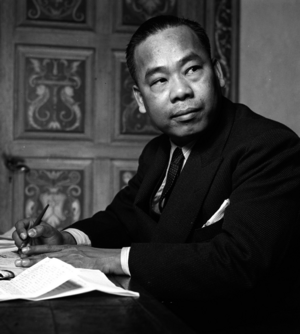U Saw facts for kids
Quick facts for kids
U
Saw
|
|
|---|---|
|
စော
|
|
 |
|
| Prime Minister of British Burma | |
| In office 1940 – 19 February 1942 |
|
| Preceded by | Maung Pu |
| Succeeded by | Paw Tun |
| Personal details | |
| Born |
Saw
16 March 1900 Okpho, Tharrawaddy District, British Burma |
| Died | 8 May 1948 (aged 48) Rangoon, Independent Burma |
| Nationality | Burmese |
| Spouse | Than Khin |
| Parents | Phoe Kyuu (father) Daw Pann (mother) |
| Occupation | Politician |
| Military service | |
| Allegiance | Galon Army |
U Saw, also known as Galon U Saw, was a well-known Burmese politician. He served as the Prime Minister of British Burma before World War II. He is also known for his part in the plot to kill Burma's national hero Aung San. This happened in July 1947, just months before Burma became independent from Britain. U Saw was later found guilty and executed for this crime.
Early Life and Education
U Saw was born on March 16, 1900, in Okpho, a town in Tharrawaddy District. This area was part of British Burma at the time. He was the second of four sons born to Phoe Kyuu, a landowner, and Daw Pann.
He went to a Roman Catholic missionary school in Gyobingauk. By 1927, he had become a senior lawyer. He was married to a woman named Than Khin.
Political Career
U Saw started his career as a lawyer. He became famous for defending Saya San, a former monk. Saya San led the Galon Peasant Rebellion from 1930 to 1932. Because of this, U Saw became known as Galon U Saw.
In 1935, he bought the Thuriya (Sun) newspaper. He used the newspaper to help his political career. In 1936, he was elected to the Legislative Council. This was Burma's main governing body under British rule.
Two years later, he started his own group called the Patriot's Party. From 1940 to 1942, he served as the third Prime Minister of Burma.
Seeking Independence
In November 1941, U Saw traveled to London. He wanted to get a promise from Winston Churchill, the British Prime Minister. U Saw hoped Burma would become a "Dominion" after World War II. A Dominion was a self-governing country within the British Empire.
He also spent time in Washington D.C., trying to convince U.S. President Franklin D. Roosevelt to help Burma gain independence. At the same time, he secretly talked with the Japanese. He wanted to secure his own future if Japan invaded Burma. The British found out about these secret talks. U Saw was then held in Uganda for four years.
Post-War Politics
After the war, U Saw returned to Rangoon. He hoped to become the first Prime Minister of independent Burma. However, the elections in April 1947 were a huge win for Aung San's group. This group was called the Anti-Fascist People's Freedom League (AFPFL).
Aung San became the leader of the Governor's Executive Council. This was like a temporary government. U Saw and other leaders like Thakin Nu attended the first Panglong Conference in 1946. This meeting discussed the future of the Shan States and other ethnic groups in Burma.
In January 1947, U Saw was part of a group that went to London. They met with the British government to discuss Burma's independence. Aung San signed an agreement, but U Saw refused to sign it.
By 1947, many political groups had their own armed forces. Aung San had the People's Volunteer Organisation (PVO). U Saw also formed his own group called the Galon tat, or Garuda Militia. This name honored his earlier defense of the Galon rebels.
The new British Governor, Sir Hubert Rance, decided to support Aung San. He invited Aung San and the AFPFL to join the Executive Council. This helped calm the political unrest after the war.
See also
- Burmese Martyrs' Day
- History of Burma

